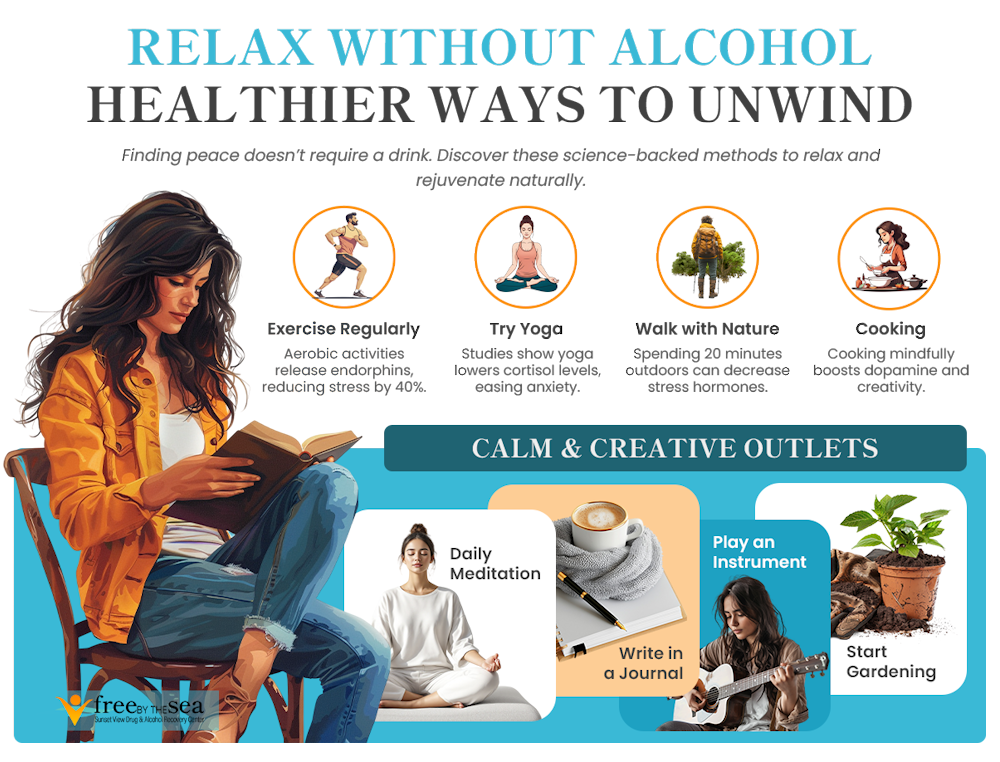In a world where almost every activity from business meetings to vacation time is accompanied by alcohol, finding solace without alcohol can seem like a daunting task. However, relaxation and unwinding need not call for a tether to the bottle. This blog embarks on a journey to uncover the different ways you can unwind, decompress, and find tranquility in the absence of alcoholic beverages.
The pursuit of relaxation is a universal endeavor, yet the paths we take can vary greatly. Alcohol has long been a common go-to for many seeking to ease the tensions of daily life, but its temporary relief comes with a cost to both physical health and mental clarity. As we delve into the heart of relaxation techniques that sidestep the need for a drink, we invite you to discover the empowering feeling of regaining control over your peace of mind.
10 Activities for Relaxing Without Alcohol
Jump to Section

Learning how to relax and enjoy yourself without the need for alcohol can be both rewarding and rejuvenating. Below are ten activities that offer a serene escape and build a sense of calm and contentment in your daily life:
Engage in Aerobic Exercise
Activities such as jogging, swimming, or cycling improve cardiovascular health and release endorphins, nature’s mood lifters, providing a natural high that surpasses any artificial buzz.
Practice Yoga
With each pose and breath, you’ll discover a deeper sense of peace, stretching away the day’s stress and inviting a tranquil energy that flows through you like a gentle stream.
Explore Meditation
Whether it’s through guided imagery, mindfulness, or silent reflection, meditation offers a sanctuary for the mind, a place where worries melt away, and a state of pure being is embraced.
Cultivate a Garden
Few things are as calming, satisfying, and centering as getting your hands dirty tending to a garden full of your favorite shrubs, herbs, flowers, or vegetables.
Create Art
Unleash your inner artist and paint your emotions onto a canvas. Whether it’s through drawing, painting, or sculpting, the act of creating art is a therapeutic process that allows you to express and release pent-up emotions without uttering a single word.
Write in a Journal
This practice not only serves as a powerful introspective tool but also helps in organizing thoughts, setting goals, and tracking progress, all while providing a quiet moment to connect with your inner self.
Learn a Musical Instrument
Hammering away on drums or making the windows rattle with a Tuba solo can be a meditative process itself, and the music you create can be a source of immense personal satisfaction.
Read a Book
Reading can transport you to different worlds, offer new perspectives, and provide a peaceful retreat from the hustle and bustle of everyday life.
Cook a New Recipe
The process of measuring, mixing, and seasoning can be a mindful activity, and the result is a delicious treat that you can enjoy with friends or savor in solitude.
Volunteer Your Time
Helping others can provide a sense of purpose and fulfillment that is often more rewarding than any temporary escape alcohol could offer.
What Is Alcohol Addiction?
Alcohol addiction (alcoholism) is a serious condition where you find yourself unable to manage or stop your alcohol consumption even when you see the negative impact it has on your life. This medical condition can range from mild to severe and is influenced by a combination of genetic, psychological, and environmental factors.
What Are the Symptoms Of Alcohol Addiction?
Alcohol addiction, also known as alcohol use disorder (AUD), manifests through different symptoms that can affect your physical, emotional, and social well-being. Below are some of the principal symptoms:
- Inability to Limit Consumption: A definitive indicator of alcohol addiction is the inability to control or limit the amount of alcohol one drinks.
- Unsuccessful Efforts to Cut Back: Despite a desire to stop or reduce alcohol intake, you may find yourself unable to do so.
- Time Consumed by Alcohol: You spend a significant amount of time obtaining, consuming, or recovering from the effects of alcohol.
- Cravings: You may feel deep urges or cravings to taste some alcohol.
- Neglect of Responsibilities: Repeated alcohol use can lead to you failing to fulfill obligations at work, school, or home.
- Continued Use Despite Problems: You may continue to drink even when you are aware of the physical, social, or interpersonal problems it’s causing.
- Social or Recreational Sacrifices: You may give up on or ignore important social, occupational, or recreational activities because of alcohol use.
- Dangerous Use: You may consume alcohol in physically hazardous situations, such as driving or operating machinery.
- Tolerance: Over time, you may need increased amounts of alcohol to achieve the desired effect, or a reduced effect is felt with continued use of the same amount.
- Withdrawal Symptoms: When you do not consume alcohol, you may feel withdrawal symptoms such as nausea, sweating, shaking, and anxiety.
How Can I Maintain Sobriety and Prevent Relapse?

Maintaining your sobriety is a continuous journey that requires dedication, support, and the development of new coping strategies. Here are some beneficial guidelines to help sustain a sober lifestyle:
- Develop a Strong Support Network: Surround yourself with people who support your sobriety, such as friends, family, or members of support groups like Alcoholics Anonymous.
- Identify and Manage Triggers: Recognize the situations, emotions, or people that may tempt you to drink and develop strategies to manage them.
- Create Healthy Routines: Establishing a structured daily routine can provide stability and reduce the risk of relapse.
- Pursue Meaningful Activities: Engage in hobbies or activities that bring you joy and fulfillment.
- Practice Mindfulness and Meditation: Mindfulness can help you stay present and aware of your thoughts and feelings without judgment.
- Seek Professional Help: Don’t hesitate to reach out to therapists or counselors who specialize in addiction.
- HALT Method: Use the HALT acronym to check in with yourself when you’re feeling off. It stands for Hungry, Angry, Lonely, and Tired – common triggers for relapse.
- Self-Care: Prioritize your physical and mental health by maintaining a balanced diet, regular exercise, and adequate sleep.
- Continuous Learning: Stay informed about addiction and recovery.
- Create a Relapse Prevention Plan: Work with a professional to develop a personalized plan that outlines steps to take when faced with high-risk situations or warning signs of relapse.
When Should I Get Additional Support?
Moments of weakness or wavering are common, and it is important to recognize when you or a loved one may need professional help. Here are some indicators that it might be time to seek additional support:
Persistent Relapse
If there are repeated instances of relapse despite efforts to maintain sobriety, it may indicate the need for more structured or intensive treatment.
Increased Tolerance
Needing more alcohol to achieve the same effect or finding that the same amount has less effect could be a sign of developing dependence.
Withdrawal Symptoms
Experiencing physical withdrawal symptoms when not drinking, such as shaking, sweating, nausea, or anxiety, suggests a physical alcohol dependence.
Impact on Daily Life
When alcohol use begins to interfere with work, school, relationships, or daily responsibilities, it’s time to consider seeking help.
Mental Health Concerns
If you’re experiencing symptoms of depression, anxiety, or other mental health issues alongside alcohol use, it’s essential to address both the addiction and the co-occurring disorder in a dual-diagnosis program.
Dangerous Behavior
Engaging in risky behaviors while under the influence, such as driving while intoxicated or having unsafe sex, is a clear sign that professional intervention is needed.
Legal Issues
Facing legal problems related to drinking, such as DUI charges, can be a wake-up call to seek support.
Concern from Others
If family members, friends, or colleagues express concern about your drinking habits, it may be time to listen and consider getting help.
If you recognize any of these signs in yourself or someone else, reach out to a doctor, addiction counselor, or local support group to explore possible solutions.
Free By The Sea Can Assist With Alcohol Addiction in WA

In the heart of Washington State, there’s a center called “Free By The Sea” that helps people who are struggling with alcohol addiction. We offer treatment programs that are specifically tailored to fit your needs and goals. We believe that the recovery journey is a life-long process. In that light, we provide you will the skills and experience to live your best life and enjoy many more years of good health and proper decisions.
Though we are based in Washington, we offer rehabilitation services to the entire Pacific Northwest and nationwide to those suffering from drug and alcohol abuse. Our mission is to help individuals find recovery, celebrate life, and achieve success, providing hope and support to anyone who wants to turn their life around and begin their future with a fresh start. Contact us today to kick off the process of reclaiming your health and control over your life.

Dr. Richard Crabbe joined our team in 2019 as our psychiatrist and medical director. He attended the University of Ghana Medical School where he became a Medical Doctor in 1977. From 1978 through 1984, he was a medical officer in the Ghana Navy and provided a variety of services from general medicine to surgeries. He received his Certificate in General Psychology from the American Board of Psychology and Neurology in 2002.

 June 25th, 2024
June 25th, 2024










